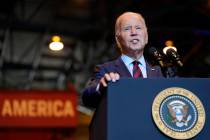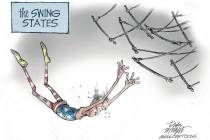EDITORIAL: Income inequality
President Barack Obama this month declared income inequality a “defining challenge of our time.” This week, he took another unilateral step to make the income gap even worse.
He was talking about the gap between households he considers “rich” and the middle class. However, the president has long considered highly paid public employees exempt from his attacks on the wealthy, the growing disparity between public-sector and private-sector compensation notwithstanding. That gap is especially wide between federal workers and common company types, and between the Washington, D.C., metropolitan area and the rest of the nation.
So, late Monday, the president through executive order granted a 1 percent pay raise to all 2.1 million federal employees. The long-expected action had no nexus to performance.
The justification for the pay raise was rooted in the argument that federal workers hadn’t received an across-the-board pay raise in four years, that salaries were “frozen.” Yes, wage scales hadn’t changed, but federal workers never stopped climbing those scales by gaining years of experience. Most federal workers also received merit pay raises, in addition to the higher salaries that accompanied promotions.
According to the U.S. Bureau of Economic Analysis, last year federal civilian workers averaged $114,976 in total compensation — $81,704 in salary and $33,272 in benefits. Meanwhile, the country’s 104 million private-sector workers averaged $65,917 in total compensation last year — $54,995 in salary and $10,922 in benefits. The typical federal worker receives 74 percent more compensation than the typical taxpaying worker. And federal workers need a pay raise?
The ever-rising wealth of the federal workforce is even more obvious when the Washington metroplex is isolated. According to the U.S. Census Bureau’s American Community Survey, the income of a typical Washington, D.C., area household increased 23.3 percent between 2000 and 2012 to an inflation-adjusted $66,583. The median household income for the country as a whole dropped 6.6 percent during the period, from $55,030 to $51,371. Nevada’s median household income plunged 11.9 percent!
Yet President Obama is borrowing more money to give pay raises to the country’s best-compensated class of workers. Like Washington itself, the president is hopelessly disconnected from the rest of the nation. Mr. Obama, stop worrying about the fortunes of government and start worrying about the people who pay for it.























